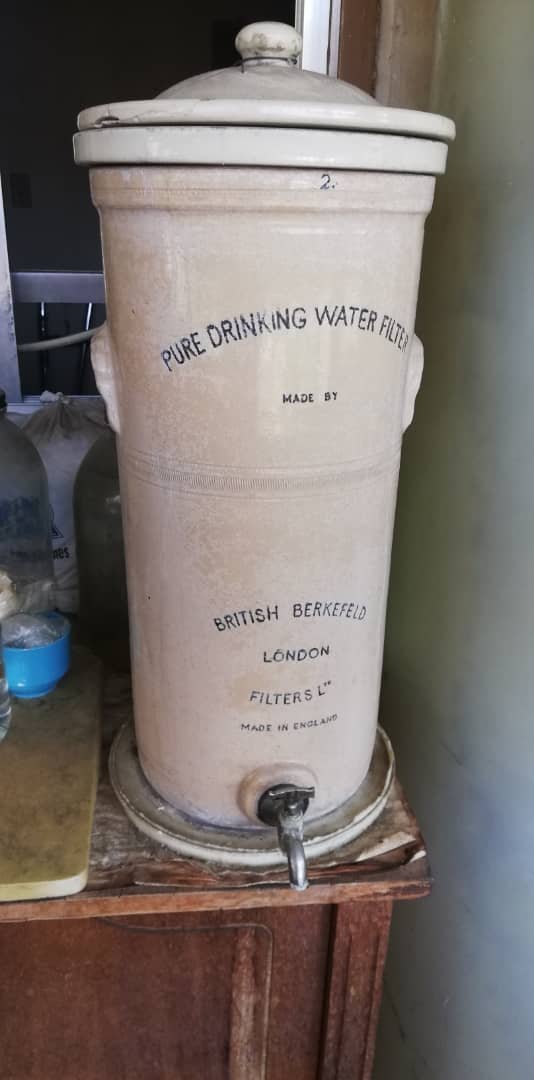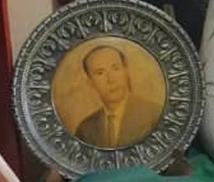
Siendo el agua un recurso vital para la vida, el ser humano desde el comienzo mismo de la historia se ha preocupado por mantenerla lo más limpia posible para su consumo. Según la IA, “los primeros filtros de agua datan del año 2.000 A.C., cuando las civilizaciones mesopotámicas utilizaban vasijas de arcilla porosa para eliminar impurezas.” Pero los atisbos de mi memoria son más cortos. Además de los actuales filtros con el apellido de un famoso alemán como marca, me vienen a la mente los filtros de ozono (Unos tíos – bien acomodados, por cierto – tenían uno). Y allá, al fondo del baúl, se asoman las nebulosas estampas que recuerdo del aljibe grande que tenía una ya difunta tía de mi padre.
Y más acá, acompañándome en las múltiples peripecias de mi vida con tantos adjetivos, se encuentra el filtro de esta historia, que sació la sed hasta de las hijas de mi vecina.
Una vez, en una clase de inglés, el profesor preguntó cómo se decía “agua potable” en el idioma de Shakespeare. Yo inmediatamente pensé en “drinking water”, recordando una imagen borrosa en un rincón de mi elusiva memoria: la vez en que mi ya difunto padre, que en la práctica no sabía hablar nada de ese idioma, me enseñaba la frase “pure drinking water filter” en ese viejo filtro que desde siempre acompañó a mi familia a todas las casas donde vivimos.
Mi padre fue un autodidacta. Él mismo relataba que a los diez años, aproximadamente, se dio cuenta de que no sabía leer ni escribir. No sé cómo hizo, pero él solito, aprendió las letras, cómo combinarlas, interpretarlas y escribirlas. Se abrió paso él solo en ese mundo entonces más hostil que ahora.
Aprendí así mis primeras palabras en inglés. De niño, nunca imaginé que estudiaría idiomas, que me convertiría en traductor y viviría de eso. Ahora veo con mucha ironía el hecho de que mi primer profesor de inglés fuera mi padre y que mi abuelo materno, que apenas sabía garabatear su nombre, me buscaría religiosamente todos los días al colegio para regresar conmigo a ponerse a hacer las tareas del día conmigo.
Ahora, por las vueltas que da la vida, hay que vender ese filtro como una pieza “vintage” para coleccionistas de antigüedades. Por ello, una amiga mía le tomó una foto recientemente con el fin de venderlo. Espero que el filtro, que mi mamá relata fue un regalo de bodas de una tía, llegue a un feliz destino; e incluso me sobreviva.
El filtro-tinajero (tal como lo describen en los sitios Web especializados en ventas) fue fabricado en Inglaterra. ¡Quién sabe dónde terminará sus días! Y cuando uno se pone a pensar tampoco uno sabe dónde, ni cómo, ni cuándo terminará sus días de vida.
Esto me hace pensar: ¿Existirá un cementerio para los objetos y los juegos que nos acompañaron durante la infancia y ya no existen en tu vida? Por ejemplo, cosas que ya no veo en la calle o ya no existen ni se fabrican, o tal vez algún anticuario todavía las tenga en uso…
Tres cosas: Un yo-yo, una perinola o un trompo… ¿Quién no jugó con esas cosas? Me pregunto: ¿con qué juegan los niños de ahora?
Ni hablar de los juguetes tecnológicos como el Atari, el Nintendo y el Wii. Ya nada de eso se encuentra ni en Internet. Yo mismo preservo un par de juegos que se ejecutaban muy bien en una antigua PC de 32 bits (que de paso no recuerdo qué ocurrió con ella). Ahora, que tengo otra PC, más avanzada, de 64 bits, y una laptop, ya no puedo jugar con ellos, aunque recuerdo que eran muy divertidos.
Definitivamente, la vida de ahora parece haber perdido todo sentido lúdico y es más sombría que la niebla que envuelve los recuerdos moribundos de los mortales que se van desvaneciendo y se derriten cada noche bajo la luna del olvido.

Una borrosa foto de mi padre cuando era joven…
INGLÉS
The English filter
Since water is a vital resource for life, human beings from the very beginning of history have been concerned about keeping it as clean as possible for consumption. According to the AI, "the first water filters date back to 2,000 BC, when Mesopotamian civilizations used porous clay pots to remove impurities." But the glimpses of my memory are shorter. In addition to the current filters with the surname of a famous German as a brand name, ozone filters come to my mind (Some uncles – with a solid financial position, by the way – had one). And there, at the bottom of the trunk, the nebulous images I remember from the big aljibe that a late aunt of my father's had.
And further on, accompanying me in the multiple adventures of my life with so many adjectives, is the filter of this story, which quenched the thirst of even my neighbor's daughters.
Once, in an English class, the teacher asked how to say "agua potable" in Shakespeare's language. I immediately thought of "drinking water", remembering a blurry image in a corner of my elusive memory: the time when my late father, who in practice could not speak any of that language, taught me the phrase "pure drinking water filter" in that old filter that had always accompanied my family to all the houses where we have lived.
My father was a self-taught man. He himself said that when he was about ten years old, he realized that he did not know how to read or write. I don't know how he did it, but by himself, he learned the letters, how to combine them, interpret them and write them down. He made his own way in that world, more hostile then than now.
That's how I learned my first words in English. As a child, I never imagined that I would study languages, become a translator and make a living out of it. Now I see with great irony the fact that my first English teacher was my father and that my maternal grandfather, who barely knew how to scribble his name, would religiously look for me every day at school to come back with me and do the day's homework with me.
Now, because of life's twists and turns, that filter has to be sold as a "vintage" piece for antique collectors. Therefore, a friend of mine recently took a photo of it in order to sell it. I hope that the filter, which my mom says was a wedding gift from an aunt, reaches a happy destination; and even outlives me.
That filtro-tinajero (as described on specialized sales websites) was manufactured in England. Who knows where it will end its days! And when you think about it, you don't know where, how, or when you will end your own life.
This makes me think: Is there a cemetery for the objects and games that accompanied us during our childhood and no longer exist in your life? For example, things that I no longer see in the street or no longer exist or are no longer manufactured – or maybe some antique dealer still has them in use?
Three things: a yo-yo, a perinola or a spinning top... Who didn't play with those things? I wonder: what do children play with nowadays?
Not to mention technological toys such as Atari, Nintendo and Wii. None of those can be found on the Internet anymore. I myself preserve a couple of games that ran very well on an old 32-bit PC (which by the way I don't remember what happened to it). Now that I have another, more advanced, 64-bit PC and a laptop, I can no longer play them, although I remember they were a lot of fun.
Definitely, life now seems to have lost all sense of playfulness and is gloomier than the fog that shrouds the dying memories of mortals who are fading and melting every night under the moon of oblivion.